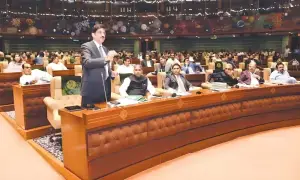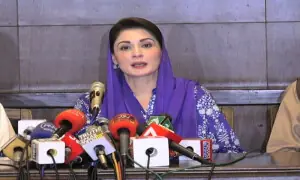Aasim Sajjad Akhtar’s two words for Pakistan’s middle class politics
3 min readFor Aasim Sajjad Akhtar, an academic and left-wing poltician, any story about Pakistan’s young population and its political aspirations must have two components: fear and desire.
“There is either the fear of this ’other,” Akhtar said, “or the desire of those who do not yet have the means of getting a corner plot in Bahria Town or an SUV.” He was speaking at the launch of his book The struggle for Hegemony in Pakistan at ThinkFest 2023.
“The middle class might be a fable but it is a powerful driver of human aspiration in the global south,” Sara Eleazar said in her introduction to the book.
Akhtar, who teaches at Quaid-e-Azam University in Islamabad, is an old and recognizable face of the Pakistani left. In his new book he argues how Pakistan’s young population is hammered by fear and desire into becoming an easy target for a sprawling digital apparatus.
“The audience I wanted to address for this book is a young generation who has been exposed to progressive ideas through social media,” he said.
But he also thinks this digitisation of politics brings a problem. “There is a classic neoliberal separation of politics and the economy,” he said, “as if these things don’t exist in tandem.” The politics being discussed in Pakistan’s digital spaces are almost devoid of economic context.
He also noted that the lack of an alternative has turned the middle classes of the country to seek economic rehabilitation at the cost of the lower classes. There is also a threat to Pakistan’s political discourse of being dominated by groups such as TLP, but Akhtar thinks the space for progressive politics is increasing.
“Twenty years ago, there was no one talking about this sort of politics,” he said.
Ammar Ali Jan, an academic who was previously affilitaed to the Punjab University agrees with Akhtar’s viewpoint that politics has become social media-centric. He added that whenever the next elections come, the left will be nowhere to be seen in the digital space. “I think Aasim is right when he repeatedly says that social media is no substitute for mass organising.”
The reason for the left’s lack of development, according to Jan, is that Pakistan has no institutions to support such a politics. He also praised Akhtar for being a progressive voice when few such people were raising their voice about the difficulties of the Baloch and Pashtun people.
But for Afiya Zia, a feminist researcher from Wesleyan University, fear and desire alone cannot tell the whole story.
“I think Aasim’s thesis is weakest: in feminism and religious hegemony,” she said. She went on to say that a group that symbolises middle class conciousness yet does not simply fit the mould of fear and desire is the MQM in Karachi, as they even put up a front against patriarchy.
But she agreed that the real pitfalls of political discourse on the internet is decontextualised and disconnected thinking that does not take power and legal structures into account.
For the latest news, follow us on Twitter @Aaj_Urdu. We are also on Facebook, Instagram and YouTube.





















Comments are closed on this story.